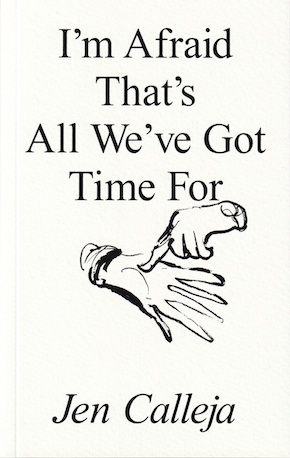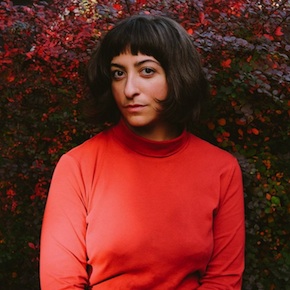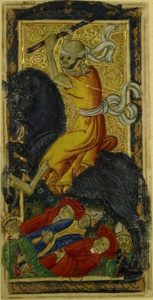The natural
by Jen Calleja
“Calleja’s writing combines wit, guile and style – social intricacies and powerplay are explored and exploded in this formidable collection.” Eley Williams
When he heard that the great Maltese actress Marianne R. was coming to Glasgow to give a series of masterclasses, Willem applied immediately. He was invited to audition a few weeks later by letter and had to plead with his agency to move his cleaning shift at the university. After all the fuss and rehearsing and putting plans in place to ensure he would be able to get enough money together to be able to afford the course, he was informed at the end of the half-hour appraisal that he would not be offered an opportunity to participate.
It hadn’t gone that badly, he thought – the panel had shared a smile between them while he spoke passionately of his love for the theatre –, but the chief judge explained to him warmly that this was a masterclass for dramatic acting, not comedic acting. He’d not mentioned comedy even once in the interview, and the monologue he had given was notoriously devastating. They must have been hysterical after a long day of interviews, he thought, remembering the way they had laughed wildly when his cap fell off the back of his head while he was walking dejectedly out of the door.
He had seen Marianne R. in a whole host of productions, and greatly admired her often dignified and subtle performances. She’d played a lawyer walking a tightrope between her career and her morals. An applauding seal of a vice president to an egotistical head of state. The eater and spewer of red-hot blame as a spin doctor. A housewife constantly dancing around her wayward husband like an attention-seeking bear pawing the air. A parent jumping through every hoop to get their child into a local school. A musician always hanging in a swing bar waiting for fame – to name a few of his favourites.
He had to meet her. He had tired of improv and am-dram, private lessons, evening classes and auditions for walk-ons. He needed to know whether he would ever make it as an actor, and he knew that she would know, she would be able to see the real him, read him, tell him if his hard work really had been all for nothing. And he could imagine how exhilarating and inspiring it would be to meet her, the stories she would tell; she probably delighted in showing off! That would be quite the anecdote in future auditions. He pictured himself suavely reclining in his seat, nodding knowingly while she opened up about her life and work, a private performance, a special moment between master and apprentice.
He called her agent in Vienna and asked if he could get a meeting with her. ‘Highly unlikely,’ the man replied in a charming Turkish accent, ‘but feel free to send her a letter, she likes those.’ He wrote to the address he gave her, a hotel just outside of Glasgow, trying to keep it as brief and to the point as he could manage. Could she spare a little time to discuss her craft with a desperately disillusioned emerging actor? A few days later, he received a reply on a piece of headed notepaper. A large yes, then a smaller Date:, Time:, and Location: and a very small ’Till then. The signature was loopy and ornate.
After studying countless head shots he was sure that some actors must surely wear a little makeup to intensify their features. This was the occasion to trial this enhancement.”
She wanted to meet at Fylkir of Copenhagen on Newlands Road at noon. He sneakily swapped a shift directly with a woman he got on with from the same cleaning agency. All he had to do now was pick out the right jeans, the right shirt, the right bowtie.
He had always found men with thick, dark eyelashes very mysterious and brooding, and after studying countless head shots he was sure that some actors must surely wear a little makeup to intensify their features. This was the occasion to trial this enhancement. He had a tube of mascara he hid in a sock in a drawer that he had taken from the makeup bag of an aunt he sometimes visited in Rotterdam. He didn’t go too often; she loved telling stories of him as an odd and clumsy and accident-prone child. She had different shades of mascara in her overflowing bag, and he chose the least dried up and claggy one. He unsheathed it from its sock, imagining he was a secret agent – it was actually a hidden knife or a gun being pulled from its holster. He opened his eyes as wide as they would go, staring into the mirror with his mouth hanging ajar, and brushed up once and down once. He managed to poke himself in the left eye and reflexively clapped a hand over it.
He sighed with his whole body when he saw it was raining outside and gasped with his whole body when he saw the time. He slipped down the final few stairs on his way out of the tenement block, and then skidded through some sodden leaflets out on the wet pavement in his rush to the bus stop.
He dived into the café and shook his short limbs and head over the doormat. He saw a broad-shouldered figure wearing a purple silk scarf capping her head and tied at the base of her neck sitting at a small table near the back of the noisy, bright room. She had her hands folded patiently in front of her, and her eyes closed, a little smile on her dark red lips. Her fingers glinted with silver rings, and a menacingly tall folded umbrella was leaning against the table.
‘Ms R., I’m Willem,’ he panted. ‘Sorry I’m a little late.’
‘Not at all, I was just running through some lines in my head. It was very relaxing.’
He went to the coat rack to hang up his yellow raincoat, turning to smile apologetically to her as he did so. He turned in time to see it drop to the floor. He bent over to pick it up and knocked someone’s chair with his backside.
‘Excuse me,’ he said, halfway between standing and squatting, miming hanging up the jacket to the older man he had butted.
While picking up the jacket and attempting to hang it again, he turned to apologise and dropped the jacket for a second time. This time, carefully bending his knees, he plucked up the jacket and carefully hung it on the hook. As he walked back over to Marianne R.’s table, he noticed she was staring at him wide-eyed.
‘Let’s have some cake!’ she announced gleefully. ‘Yes, good afternoon, we’ll have two of those plump little doughnuts please. They have an apple filling, Willem! Two small glasses of ice-cold milk to drink, and espresso? Two espressos.’
I wanted to talk to you about my future as an actor. I feel that I have great potential, but that no one can really see it.”
While they waited, Willem smoothed out his damp CV on the table along with his list of questions and read them through quickly in his head, moving his lips, while Marianne R. watched him, smiling with composure. Before he could begin to go through them, she took the little pile and folded them away out of sight.
‘Let’s make some room, shall we.’
As the refreshments were laid out on the table she tittered and giggled, scrunching up her small, golden, wrinkly hands and shaking them about in anticipation.
‘Oo, thank you, thank you!’
Willem noticed his lower back was starting to ache from sitting up so straight. He kept his head perfectly still and tried to only move his eyes.
‘Ms R., I know how busy you are and I really appreciate your agreeing to see me. I wanted to ask…’
‘Ah, you prefer sweetener to sugar?’ she said more than asked, stirring honey into her milk.
‘Um. I like the taste.’
He didn’t particularly like the taste of sweetener. In fact, it felt like his actions were not his, and that someone else was making these stiffly restrained movements for him, like he was a marionette hanging from strings, or that his skin and every object on the table were covered in tiny, invisible fleas setting everything in motion.
‘I see. Very good. Continue.’
‘Is… that bad? That I chose sweetener?’
‘No, no, no, please, carry on.’
‘Yes. I wanted to talk to you about my future as an actor. I feel that I have great potential, but that no one can really see it.’
‘These look fantastic,’ she muttered, picking up a flattish doughnut topped with a dusting of sugar and eagerly biting into it.
He nervously stirred the powdered sweetener into his espresso and knocked it back immediately, burning his mouth. He quickly raised the glass of milk to his face, prodding the inside of his nostril with the straw he’d failed to see. He snorted, frothing the milk before yanking the straw out of his nose, and the glass. He hoped Marianne R. hadn’t seen; she appeared to have been chewing with her eyes closed.
‘I’ve been trying to become an actor for a few years now, on the side of a full-time job, and I suppose I’m at a bit of a crossroads.’
‘Have a doughnut, they’re divine.’
He robotically picked up the plump, pancake-like pastry and took a huge bite while still talking.
‘I had to meet you to see if – hm, it’s very good, thank you – if you had any advice for me.’
Marianne R. blew bubbles in her milk and looked around the café without answering. She put down her glass and licked her thumb to pick up the leftover sugar on the plate, putting her whole thumb with its long, maroon nail into her mouth.
‘Oh, excuse me, you have a fly, just there, on your nose, allow me.’
Willem leant forward; the chair legs gave a short screech against the floor as he accidently bumped his palm into the actress’s nose. She looked quite shocked but smiled and gave an embarrassed little cough, wiping her nose with her napkin.
‘I’m sorry, I didn’t mean to do that.’
Marianne R. balanced her face on her fist and surveyed him with amused brown eyes. She seemed very quiet and immature for such a serious, revered actress in her sixties; he guiltily felt a little disappointed. He tried to mirror her casual body language, settling his chin on his hand, but his palm was so sweaty he slid off and had to quickly correct himself. He sat upright again.
‘How do people respond to your acting?’ Marianne R. asked, cocking her head.
‘How do they respond? As in, do they like it?’
‘I mean, how do they respond? Do they respond in the way you would like them to respond?’ She took two long nips of her espresso.
‘Well. I would say that I’m not taken seriously as an actor. People don’t seem to care about openly laughing at me, in fact. No matter what I do, people just stare at me, smiling. Always smiling! They say I have “a naïve charm” or “a childlike quality”. Everything I go for I’m told I’m not right for it. I’ve been called “a natural” so many times, but “a natural” what?’
She didn’t say anything. She looked at him, a bold smile fixed on her face, shaking her head a little. He took this to signify that he had exhausted her patience.
The waiter came by and laid down their bill paperclipped to a Tarot card.
‘Ah, Death!’ Marianne R. beamed, sliding it towards Willem like another pastry.
He looked distressed and confused.
‘Rebirth, Willem!’
‘Let me get the bill, it’s the least I can do after you’ve listened to me babbling on for so long,’ Willem said urgently.
‘Darling, you’re an absolute riot,’ she shrieked, gripping his head with both cold hands and kissing him on both cheeks. ‘You have absolutely nothing to worry about. Please, don’t let anyone take you seriously!'”
His hand knocked over the small glass vase between them, the single red carnation landed on the table and a spray of water studded the black silk robe Marianne R. was wearing.
She rose up, then began to tremble. Her eyes and mouth were puckered closed and tears formed in her crinkled eyes. She placed both hands flat on the table and bent slightly at the waist, making gulping noises.
Willem jumped up, knocking his knee painfully on the table and hugging it to himself, standing on one leg. He asked Marianne R. if she was alright, he was so sorry, was she unwell?
She wiped her eyes with the back of her hand, pinched her headscarf back down her forehead a little, took a few breaths, ‘Delightful. Delightful!’ She looked at her watch and could see an imminent exit in her future.
‘Darling, you’re an absolute riot,’ she shrieked, gripping his head with both cold hands and kissing him on both cheeks, mm-wah, mm-wah. ‘You have absolutely nothing to worry about. Please, don’t let anyone take you seriously!’ she chided, picking up her umbrella and round, black purse with his crumbled papers sticking out of it. She artfully laid down a note to cover the bill, patted his CV, chuckled her way out of the held-open door, trailed a waving hand behind her and climbed straight into a waiting car.
And she was gone. He flopped back down into his chair and watched the car drive off. He turned his head away from the door and was drawn to his reflection in the back of the brushed chrome coffee machine.
His lips pink and sore from the hot coffee, cheeks flushed with the imprint of Marianne R.’s lipstick and streaked with powdered sugar, his nose red from the cold, bluish mascara blotchy around his eyes.
He screwed up his face and stuck out his tongue, just to see if he liked it.
From the collection I’m Afraid That’s All We’ve Got Time For (Prototype, £12)
 Jen Calleja is a writer and literary translator originally from Shoreham-by-Sea, West Sussex, and now based in London. Her debut collection of poetry, Serious Justice, was published by Test Centre (2016), followed by the pamphlet Hamburger in the Archive (If a Leaf Falls Press, 2019). Her short fiction and poetry have appeared in many publications and anthologies including Ambit, 3:AM, Somesuch Stories, Funhouse, Another Gaze, Hotel, Structo, Prototype and Spells: 21st Century Occult Poetry (Ignota, 2018). She was shortlisted for the Man Booker International Prize 2019 for her translation of Marion Poschmann’s The Pine Islands (Serpent’s Tail) and was the inaugural Translator in Residence at the British Library. She plays or has played in the bands Sauna Youth, Feature, Monotony and others. I’m Afraid That’s All We’ve Got Time For is published by Prototype in paperback and eBook.
Jen Calleja is a writer and literary translator originally from Shoreham-by-Sea, West Sussex, and now based in London. Her debut collection of poetry, Serious Justice, was published by Test Centre (2016), followed by the pamphlet Hamburger in the Archive (If a Leaf Falls Press, 2019). Her short fiction and poetry have appeared in many publications and anthologies including Ambit, 3:AM, Somesuch Stories, Funhouse, Another Gaze, Hotel, Structo, Prototype and Spells: 21st Century Occult Poetry (Ignota, 2018). She was shortlisted for the Man Booker International Prize 2019 for her translation of Marion Poschmann’s The Pine Islands (Serpent’s Tail) and was the inaugural Translator in Residence at the British Library. She plays or has played in the bands Sauna Youth, Feature, Monotony and others. I’m Afraid That’s All We’ve Got Time For is published by Prototype in paperback and eBook.
Read more
jencalleja.com
@niewview
@prototypepubs
Author portrait © Sophie Davidson



